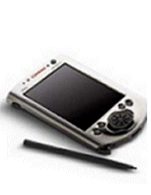WFU uses hand-held technology to enhance class participation
 New technology being tested at Wake Forest University makes it possible for students to ask their professor a question during class without saying a word. It allows professors to instantly gauge the effectiveness of their lecture without the time-consuming process of grading dozens of papers.
New technology being tested at Wake Forest University makes it possible for students to ask their professor a question during class without saying a word. It allows professors to instantly gauge the effectiveness of their lecture without the time-consuming process of grading dozens of papers.
This new technology—christened PocketClassroom by its designers at Wake Forest University— makes the classroom environment more interactive and takes advantage of the latest and growing trend in personal computers—the hand-held.

PocketClassroom, soon-to-be trademarked by Wake Forest, was designed for the iPAQ personal hand-held computer by the university’s Information Systems staff in 2001. It allows students to send private messages to their professor during class and lets the professor conduct impromptu quizzes to see if students understand the material. The software also features its own Web server, allowing the professor to launch class-specific Web sites and Power Point presentations from the palm of a hand.
The program and its applications are on the cutting edge of hand-held technology for the classroom and word about the software’s benefits is spreading. The university has made the software available for free download from the Wake Forest Web site. Anne Bishop, director of Wake Forest’s Information Systems research and development, says approximately 30 schools have already downloaded the software, including the United States Air Force Academy, East Carolina University and Winston-Salem State University.
“We think PocketClassroom has the potential to increase students’ participation and interest in class and generate a lot more excitement about the learning environment,” says Bishop.
The university tested the software last fall. Students in professor Rick Matthews’ physics class were given iPAQs for the semester and encouraged to familiarize themselves with it beyond its use in the classroom. Matthews used the iPAQs and PocketClassroom to update a teaching method he had long employed—the concept test.
The concept test is based on the idea of creating spontaneous quizzes during class to determine if students understand the lesson. With PocketClassroom, Matthews would pose a multiple-choice question to the class and each student would answer on their hand-held computer. The information was then instantly sent to Matthews’ iPAQ in the form of a number scale and graphed to reveal how many students chose the correct answer. If most of the students answered incorrectly, Matthews would review the topic right there in class.
“We found that these conceptual, multiple-choice questions given right in the middle of class are a very effective way of improving students’ understanding of the concepts,” says Matthews, chair of the physics department. “The real benefit of PocketClassroom is the ability for all the students to provide feedback to you whenever they want.”
Allowing students to ask questions instantly and anonymously is significant, says Bishop, remembering her own days as a high school teacher in front of a room full of students. The instructor is given feedback on points that may need further explanation and students can clarify a topic without potentially embarrassing themselves in front of their classmates, she says. The professor can then choose to address the question to the entire class, or speak with the student individually after class.
“PocketClassroom can really be used as a teaching evaluation,” Bishop says. “It gets students more involved in the process.”
Matthews also used the software to control his classroom Power Point presentations from his hand. The mobile control allowed him to pay closer attention to the topic and the students, instead of keeping his eyes on his computer.
“I didn’t have to juggle one control for my presentation and something else to point to the screen, you can do it all in one application,” Matthews says.
Bishop acknowledges that the benefits of PocketClassroom are greater in larger lecture classes than more intimate discussion-dominated classes. She also notes that the software is not intended to be a substitute for personal interaction between professor and students, but a way to enhance that relationship. Before hand-held computers become standard equipment at Wake Forest, Bishop says the university will have to make sure the benefits are worth it.
“Ideally, at some point hand-held computers may be part of our package,” she says. “But, we want to make sure of the value to our students before we commit to that.”
Continued testing and evaluations will be the measure. Bishop and staff have demonstrated the software at several conferences across the country and Hewlett-Packard, maker of the iPAQ, asked the university to present the PocketClassroom software to its national marketing managers last spring. Emerging technology companies in the process of developing similar software have inquired about the program.
A nutrition class in Wake Forest’s health and exercise science department will be the next to test iPAQ and PocketClassroom this fall. The class will use the program to aide in students’ group work, simplify distribution of class materials and create their final project in the form of a Web page, designed with and viewed by their hand-held computers.
Categories: Campus Life, Experiential Learning
Media Contact
Wake Forest News
media@wfu.edu
336.758.5237



